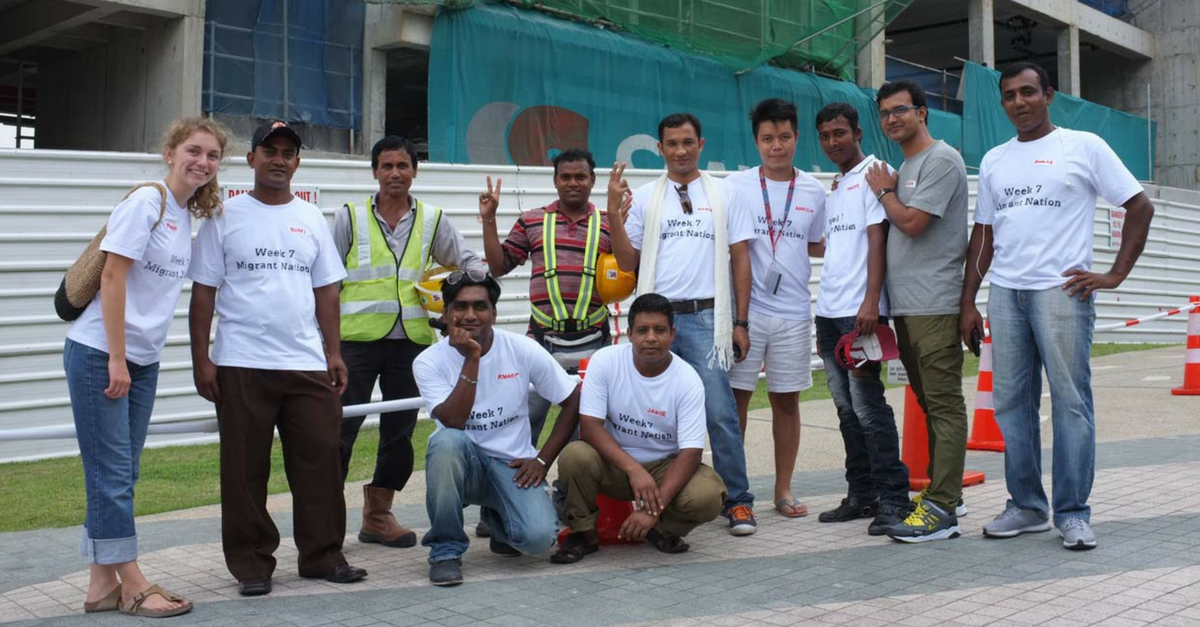Google Singapore and many beautiful pictures of our city appear. In just half a century, we have progressed from a struggling, developing nation to a first world independent country.
As we grow from strength to strength, there are still kinks in our country that are being overlooked. With our current strength and resourcefulness, we no longer have the luxury of ignoring them.

Enter the countless migrant workers, the backbone of our sprawling metropolis, since the inception of our transformation. It’s a wonder why they are not celebrated more for their contributions like how others who’ve been instrumental to our growth are.

The Issues Migrant Workers Face In Singapore
Many migrant workers in Singapore face social prejudice.
Be it the illogical and unruly belief that locals should have priority of seats in public transport or the stereotype that they always smell bad.
Think about it, you have probably seen someone sneer at them in the train or read the news about yet another local scolding them for occupying the seats recently.
They have done nothing to warrant such treatment from the general public.
Many of them also face poor living conditions and unsafe work practices, often in an effort by employers to cut costs.

While we pride ourselves as being highly efficient, Singapore still has not implemented a minimum wage law. Do you know that many migrant workers take home an average of $800 monthly? Most of them have families back home to feed – and you thought your allowance or pay was bad.
Furthermore, take away costs for expenses coupled with shady cuts from unscrupulous employers, there’s really not much left, is there?
More importantly, migrant workers are often at the mercy of their employers due to the lack of legal coverage, minimum wage laws or even medical care.
Why Should We Care?
Many of the migrants I met during time spent volunteering at the Cuff Road Project are owed their salaries anywhere from 3 months to a year.
Many workers are also afraid of letting their employers know about injuries sustained during work as they fear being released back home without pay. Hence, they continue working despite being injured.
More infuriatingly, when these workers do actually see a doctor, some employers choose to turn a blind eye to the problems – by withholding information or ignoring the doctor’s instructions.

The troubling reality is that migrant workers who opt to fight their cases usually have their employment terminated. Thus, they’re granted a special pass for the remaining of their stay in Singapore.
Legally, they are not allowed to work in Singapore while on this pass. This creates a limbo where they’re stuck in Singapore without any means of earning an income, and without any assistance.
What Should We Do To Help?
While the government and authorities hold the largest slice of the pie in solving these issues, we can also do our part as Singaporeans to make our society a better place for these migrant workers to live in.

There are a few groups trying their best to address issues of unequal treatment.
One such organisation, Transient Workers Count Too (TWC2), provides a vast array of social assistance. The Cuff Road Project is an initiative that provides 2 meals a day, 6 days a week to migrant workers who require help. There are also many other non-governmental organisations where you can volunteer at that offer their services to migrant workers.
However, we cannot rely on just a few organisations to initiate change. It all comes down to us.
By creating more awareness, we can shine a light on these workers who desperately need our help.
After all, these migrant workers are not asking for anything more, only something just. As we go on to celebrate our 52nd year of independence, can we really forget those who have built our beautiful city in the first place?
If you’d like to lend a hand:
Transient Workers Count Too
Address: 5001 Beach Road, #09-86, Golden Mile Complex, Singapore 199588
Phone: 6247 7001
Email: [email protected]
Helpline: 1800 888 1515
Header Image Source: kwiknews.my
Also, read Tired Of Our Increasingly Aloof Society? Here Are 11 Organisations You Can Volunteer At!






